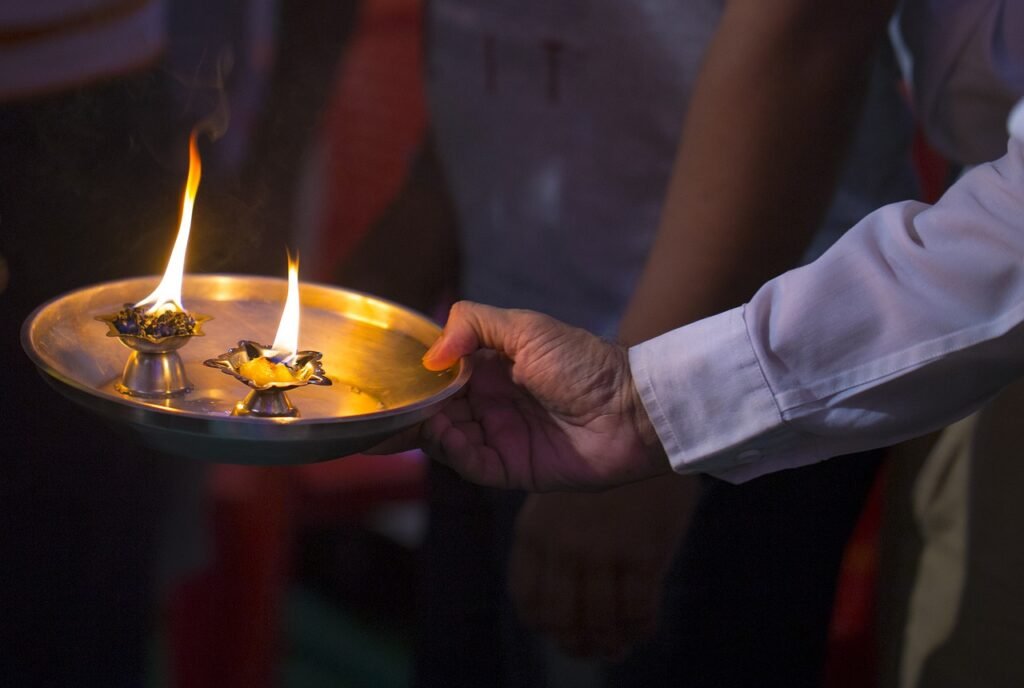Arti (also spelled Aarti) is an essential ritual in Hindu religious practice. It is a form of offering light, usually through a flame or lamp, to deities, expressing devotion and reverence. Arti is performed at the conclusion of pujas (worship ceremonies), prayers, and other religious rituals, symbolizing the end of the worship and invoking blessings from the divine. It is a vital part of daily Hindu religious life, and its significance grows even more during special festivals like Diwali.
Components of Arti
-
- The Lamp (Diya): The centerpiece of the Arti ritual is the lamp or diya, traditionally fueled by ghee (clarified butter) or oil. The lamp’s flame represents spiritual enlightenment and the removal of ignorance. The light offered to the deity is symbolic of purity, goodness, and the illumination of knowledge.
-
- Chanting Hymns and Mantras: Devotional songs or bhajans are often sung during Arti. These hymns, rich in spiritual meaning, glorify the deity and express devotion. The hymns also create a sacred atmosphere, enhancing the connection between the devotee and the divine.
-
- Other Offerings: Incense sticks, flowers, and sometimes food are also offered during Arti. The incense represents purification, while flowers symbolize beauty, love, and the cycle of life. In some cases, water, rice, and sandalwood paste are also used to honor the deity.
Importance of Arti in Hinduism
The Arti ceremony holds deep spiritual significance. At its core, it represents the offering of oneself to the divine and seeking the divine’s blessings. The flame in Arti symbolizes the light of knowledge, which is meant to remove the darkness of ignorance. It represents an exchange of energy between the devotee and the divine, where the devotee offers light and devotion and, in return, receives divine blessings and guidance.
The circular motion of the Arti lamp, which is waved before the deity, reflects the cyclical nature of life and the universe. The light from the flame dispels darkness, symbolizing the removal of obstacles, and ushers in positive energy, hope, and spiritual clarity.
Significance of Arti During Diwali
Diwali, the festival of lights, celebrates the triumph of good over evil, light over darkness, and knowledge over ignorance. Arti plays a pivotal role during this festival, as it embodies the central theme of light and purity. During Diwali, Hindus worship various deities, especially Lakshmi, the goddess of wealth and prosperity. Performing Arti during Diwali is a way to invoke her blessings for wealth, health, and happiness in the coming year.
-
- Victory of Light Over Darkness: Diwali’s primary theme is the victory of light over darkness, and Arti epitomizes this symbolism. The light of the lamp offered during Arti drives away negativity and darkness, both literally and symbolically. This reinforces the spiritual message of Diwali: that goodness, wisdom, and righteousness will always prevail.
-
- Invoking Prosperity: Arti is an essential part of the Lakshmi Puja during Diwali, where devotees seek the blessings of Goddess Lakshmi for prosperity and abundance. Arti invokes her presence, purifying the surroundings and ensuring that her blessings grace the home.
-
- Cleansing and Purification: Performing Arti during Diwali cleanses the home, body, and mind. It is believed that the light and smoke from the lamps and incense dispel negative energy and invite positive vibrations into the space. This purification is especially important during Diwali, a time for new beginnings.
-
- Cultural Tradition: Arti during Diwali is a way of keeping Hindu traditions alive. Families come together to perform the ritual, reinforcing bonds of faith and community. It is not just an act of individual worship but a collective expression of devotion, offering peace and positivity to all.
Conclusion
Arti in Hinduism is much more than a ritual; it is a form of devotional expression that connects the human soul with the divine. During Diwali, its significance is amplified as the light of Arti symbolizes the festival’s core themes of hope, prosperity, and spiritual enlightenment. By performing Arti, Hindus invite the blessings of the divine into their homes and lives, ensuring a prosperous and harmonious year ahead.


